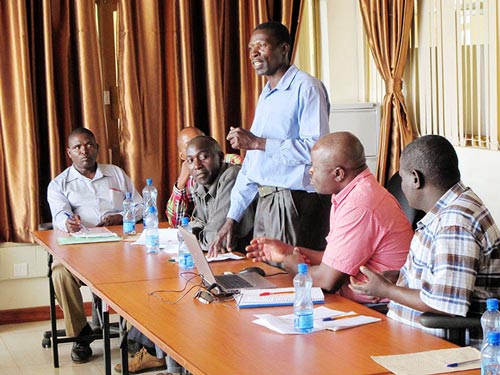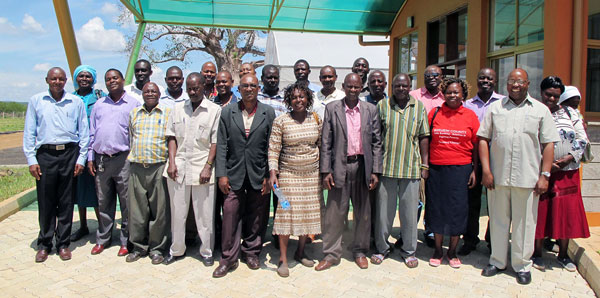By Wandera Ojanji/CIMMYT
Buoyed by the success of a campaign to curb the spread of maize lethal necrosis (MLN), the farming community around the Kiboko Crops Research Station in Makueni County, Kenya, agreed to create a maize-free window during August and September and to plant within two weeks of the onset of long rains in April.
The decisions follow an effective campaign by CIMMYT, the Kenya Agricultural Research Institute (KARI) and the Makueni County Ministry of Agriculture last year to create a maize-free window in March and April 2014, which required farmers to stop planting maize between the end of October 2013 and the end of February this year. The maize-free windows are critical in interrupting the disease cycle, thus reducing the population of vectors.

A meeting was organized on 1 April by Stephen Mugo, principal scientist and maize breeder for CIMMYT’s Global Maize Program, in partnership with KARI and the Makueni County Ministry of Agriculture at the Kiboko Crops Research Station. More than 25 people attended, including county administration, local community leaders, religious leaders, Makueni County agricultural staff, Kiboko farmers and CIMMYT and KARI scientists.
“Farmers did, to a very large extent, respect and adhere to our resolution to have a maize-free window, which was enough to reduce vector density and consequently transmission,” Mugo said. According to Lucas Ngulu, Makindu District agricultural officer, more than 95 percent of farmers within a 5-kilometer radius of the Kiboko Crops Research Station followed the resolution passed at the first MLN stakeholders meeting on 1 October 2013. They did not plant maize and instead planted cowpeas and pigeonpeas during the period. Joel Mbithi, farm manager for the CIMMYT Kiboko Crops Research Station, attributed the success to the aggressive awareness campaigns that partners conducted in the area.
However, most of the farmers who grow maize under irrigation did not adhere to the call for a maize-free window. Their decision is attributed partly to a lack of understanding about the importance of the campaign and partly driven by the need to earn a living, as most of them depend on the sale of irrigated maize for their livelihoods.
Isaac Kariuki, the Makindu District deputy agricultural officer, noted that the few farmers who did not adhere to the advice lacked proper and accurate information on the disease. He called on the team to provide accurate information in a timely manner and to do everything possible to bring the remaining farmers on board. Some farmers wrongly believed that the disease is controlled by heavy rains. “As fate would have it, those farmers who still went ahead and planted maize lost their crop to drought that hit the region after the initial heavy and consistent rains,” Kariuki said.
Reverend Reuben Mulwa called on participants to be ambassadors and reach out to fellow farmers to respect and adhere to the maize-free windows. “Lead by example by being the first to adhere to the resolution,” Mulwa said. “But take due diligence when talking to other farmers about respecting and adhering to these resolutions.”
 Innovations
Innovations 
